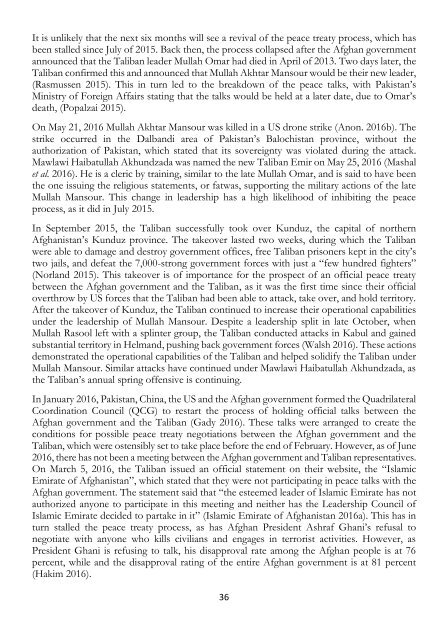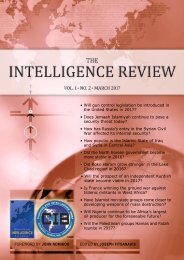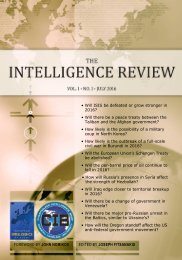The Intelligence Review | vol. 1 | iss. 1 |
This volume is the product of a collaboration between the European Intelligence Academy (EIA) and the Chanticleer Intelligence Brief (CIB), a student-run initiative supported by the Department of Politics at Coastal Carolina University in Conway, South Carolina, United States. Eleven CIB analysts tackle some of the most pressing and timely questions confronting intelligence observers today. Topics range from the price of oil to political stability in Venezuela, from the territorial cohesion of Iraq to the future of the Islamic State, and many other pressing subjects that feature daily in news headlines. CIB analysts propose carefully crafted and informed forecasts that outline future developments in some of the world's most unpredictable hot spots.
This volume is the product of a collaboration between the European Intelligence Academy (EIA) and the Chanticleer Intelligence Brief (CIB), a student-run initiative supported by the Department of Politics at Coastal Carolina University in Conway, South Carolina, United States. Eleven CIB analysts tackle some of the most pressing and timely questions confronting intelligence observers today. Topics range from the price of oil to political stability in Venezuela, from the territorial cohesion of Iraq to the future of the Islamic State, and many other pressing subjects that feature daily in news headlines. CIB analysts propose carefully crafted and informed forecasts that outline future developments in some of the world's most unpredictable hot spots.
- No tags were found...
You also want an ePaper? Increase the reach of your titles
YUMPU automatically turns print PDFs into web optimized ePapers that Google loves.
It is unlikely that the next six months will see a revival of the peace treaty process, which has<br />
been stalled since July of 2015. Back then, the process collapsed after the Afghan government<br />
announced that the Taliban leader Mullah Omar had died in April of 2013. Two days later, the<br />
Taliban confirmed this and announced that Mullah Akhtar Mansour would be their new leader,<br />
(Rasmussen 2015). This in turn led to the breakdown of the peace talks, with Pakistan’s<br />
Ministry of Foreign Affairs stating that the talks would be held at a later date, due to Omar’s<br />
death, (Popalzai 2015).<br />
On May 21, 2016 Mullah Akhtar Mansour was killed in a US drone strike (Anon. 2016b). <strong>The</strong><br />
strike occurred in the Dalbandi area of Pakistan’s Balochistan province, without the<br />
authorization of Pakistan, which stated that its sovereignty was violated during the attack.<br />
Mawlawi Haibatullah Akhundzada was named the new Taliban Emir on May 25, 2016 (Mashal<br />
et al. 2016). He is a cleric by training, similar to the late Mullah Omar, and is said to have been<br />
the one <strong>iss</strong>uing the religious statements, or fatwas, supporting the military actions of the late<br />
Mullah Mansour. This change in leadership has a high likelihood of inhibiting the peace<br />
process, as it did in July 2015.<br />
In September 2015, the Taliban successfully took over Kunduz, the capital of northern<br />
Afghanistan’s Kunduz province. <strong>The</strong> takeover lasted two weeks, during which the Taliban<br />
were able to damage and destroy government offices, free Taliban prisoners kept in the city’s<br />
two jails, and defeat the 7,000-strong government forces with just a “few hundred fighters”<br />
(Norland 2015). This takeover is of importance for the prospect of an official peace treaty<br />
between the Afghan government and the Taliban, as it was the first time since their official<br />
overthrow by US forces that the Taliban had been able to attack, take over, and hold territory.<br />
After the takeover of Kunduz, the Taliban continued to increase their operational capabilities<br />
under the leadership of Mullah Mansour. Despite a leadership split in late October, when<br />
Mullah Rasool left with a splinter group, the Taliban conducted attacks in Kabul and gained<br />
substantial territory in Helmand, pushing back government forces (Walsh 2016). <strong>The</strong>se actions<br />
demonstrated the operational capabilities of the Taliban and helped solidify the Taliban under<br />
Mullah Mansour. Similar attacks have continued under Mawlawi Haibatullah Akhundzada, as<br />
the Taliban’s annual spring offensive is continuing.<br />
In January 2016, Pakistan, China, the US and the Afghan government formed the Quadrilateral<br />
Coordination Council (QCG) to restart the process of holding official talks between the<br />
Afghan government and the Taliban (Gady 2016). <strong>The</strong>se talks were arranged to create the<br />
conditions for possible peace treaty negotiations between the Afghan government and the<br />
Taliban, which were ostensibly set to take place before the end of February. However, as of June<br />
2016, there has not been a meeting between the Afghan government and Taliban representatives.<br />
On March 5, 2016, the Taliban <strong>iss</strong>ued an official statement on their website, the “Islamic<br />
Emirate of Afghanistan”, which stated that they were not participating in peace talks with the<br />
Afghan government. <strong>The</strong> statement said that “the esteemed leader of Islamic Emirate has not<br />
authorized anyone to participate in this meeting and neither has the Leadership Council of<br />
Islamic Emirate decided to partake in it” (Islamic Emirate of Afghanistan 2016a). This has in<br />
turn stalled the peace treaty process, as has Afghan President Ashraf Ghani’s refusal to<br />
negotiate with anyone who kills civilians and engages in terrorist activities. However, as<br />
President Ghani is refusing to talk, his disapproval rate among the Afghan people is at 76<br />
percent, while and the disapproval rating of the entire Afghan government is at 81 percent<br />
(Hakim 2016).<br />
36





